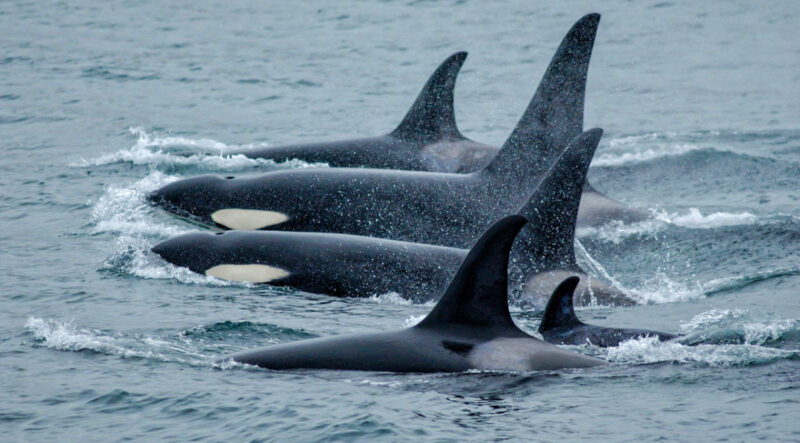US federal agency debunks fake claims by anti-aquaculture activists
In a new study, American fisheries scientists concur with their counterparts in Canada and Scotland that marine finfish aquaculture has little to no negative impact on wild stocks and whales.
By Fabian Dawson
SeaWestNews
A new sweeping American study about open-net aquaculture in the Pacific Northwest shows once again that the claims being made by anti-salmon farm activists in Washington State and neighbouring British Columbia to be false.
The 215-page biological opinion by the Marine Service of the National Oceanic and Atmospheric Association (NOAA) found that marine finfish aquaculture in Puget Sound, has little to no negative impact on native species, such as endangered salmon, Orcas, or their habitats.
The conclusions are similar to nine-peer reviewed studies by scientists at Canada’s Department of Fisheries and Oceans (DFO) which found that salmon farms in BC’s Discovery Islands have less than a minimal impact on migratory stocks.
The NOAA study comes in the wake of a landmark 9-0 ruling, by the Washington State Supreme Court which recently ruled that claims about disease and sea lice impacting wild stocks, falsely and widely propagated by anti-fish farm activists in the Pacific Northwest, to be without merit.
Weeks earlier, a seven-decade aquaculture analysis conducted in Scotland also showed that salmon farms have nothing to do with declining wild stocks.
Last summer, researchers at the University of BC, dismantled a key bogus claim by anti-aquaculture activists, that the piscine reovirus (PRV) will devastate wild salmon on Canada’s west coast. This study, like the ones before, refutes core apocalyptic fearmongering by the activists who tell their mainly urban followers that viruses and sea lice, allegedly spread from fish farms, cause diseases in wild salmon stocks.
But despite volumes of science proving otherwise, the activists have brainwashed their following to attack salmon farmers in the Pacific Northwest. Some, without any evidence, have begun accusing the government scientists of being bribed by the industry on social media. They have also pressured the Trudeau Liberals to phase out open-net operations in British Columbia, or risk losing their votes.
The central underpinning of the anti-salmon farm activists on both sides of the border is that any science that challenges their unscientific observations, should not be believed.
The latest NOAA study was released after Cooke Aquaculture Pacific was granted a permit to farm Pacific Steelhead trout in partnership with the Jamestown S’Klallam Tribe by the Washington Department of Fish and Wildlife (WDFW). This agency has also warned the public to be wary of the anti-fish farming lobby, because it “misuses scientific literature to exaggerate risks to native salmon.”
In its new biological analysis, NOAA found that the permit given to Cooke Is “not likely to jeopardize the continued existence” of Puget Sound and Georgia Basin species, including Chinook salmon, steelhead, chum, yelloweye rockfish, or bocaccio.
Marine finfish aquaculture in the area is “not likely to result in the destruction or adverse modification of the designated critical habitats for any of the listed species,” the study said.
“This study, along with the recent unanimous Washington Supreme Court decision upholding Cooke Aquaculture Pacific’s permit to raise native steelhead in Puget Sound, finally puts to rest one of the biggest myths of all: that fish farming has a negative impact on endangered Chinook salmon and Orcas,” said Jim Parsons, president of the Northwest Aquaculture Alliance (NWAA).
“Given the current world situation, it’s time for Washington to lead the way in delivering fresh, locally produced, seafood to consumers throughout the Pacific Northwest and the United States,” said Parsons.
“We encourage our leaders to rely on science rather than politics or claims made by certain anti-aquaculture activist groups…sustainable aquaculture not only produces the nutritious, affordable food our world needs, but it also benefits working families in our rural communities.”
Joel Richardson, Vice President Public Relations for Cooke Aquaculture said the conclusive scientific NOAA report and recent Washington State Supreme Court decision, reaffirm that the Wild Fish Conservancy and other activist groups has been deceiving the public by making false claims about the impacts of fish farming.
“Activist organizations, including those in BC, should be held accountable by governments and have their non-profit and charitable status revoked for spreading disinformation which harms hard working families and jobs, and destabilizes local small business supply chains and domestic food security,” he said.
Salmon farmers in BC are currently operating in an era of uncertainty after the Trudeau Liberals, in pre-election pledges to get at the activist votes, have stalled the renewal of 79 aquaculture licenses.
A study released last week, said British Columbia’s indigenous and non-Indigenous coastal communities will lose more than 4,700 jobs and $1.2 billion in economic activity annually if the Federal Government does not renew the farming licences immediately.
BC’s salmon farmers, are also awaiting a judicial review of the Dec 2020 decision to phase out open-net operations in the Discovery Islands.
This decision alone will see the province losing almost $390 million in annual economic output with $87 million less in annual salaries and benefits, and 1,535 fewer jobs, according to an independent analysis.
(Image of Orcas in the Pacific Northwest courtesy of NOAA)
